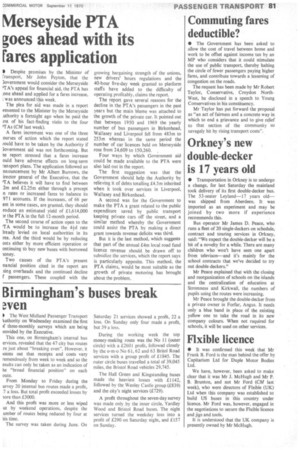Merseyside PTA goes ahead with its rares application
Page 79

If you've noticed an error in this article please click here to report it so we can fix it.
D Despite promises by the Minister of Transport, Mr John Peyton, that the lovernment would consider the Merseyside TA's appeal for financial aid, the PTA has one ahead and applied for a fares increase, was announced this week.
The plea for aid was made in a report 'resented to the Minister by the Merseyside uthority a fortnight ago when he paid the rst of his fact-finding visits to the four 'TAs (CM last week).
A fares increment was one of the three our ses of action which the report stated iould have to be taken by the Authority if lovernment aid was not forthcoming. But he report stressed that a fares increase ould have adverse effects on long-term .ansport plans. The application followed an nnouncement by Mr Albert Burrows, the irector general of the Executive, that the 'TA believes it will have to find between 2m and £2.25m either through a precept n rates or increased fares to balance its 971 accounts. If the increases, of 66 per ent in some cases, are granted, they should roduce an estimated yield of £1,614,000 )r the PTA in the full 12-month period. The second course of action open to the TA would be to increase the 44-d rate treacly levied on local authorities in its rea. And the third would be by reducing osts either by more efficient operation or ontinuing to buy new buses with borrowed toney.
Two causes of the PTA's present nancial position cited in the report are sing overheads and the continued decline f passengers. These coupled with the growing bargaining strength of the unions, new drivers' hours regulations and the 40-hour five-day week granted to platform staffs have added to the difficulty of operating profitably, claims the report.
The report gave several reasons for the decline in the PTA's passengers in the past years but the main blame was attached to the growth of the private car. It pointed out that between 1950 and 1969 the yearly number of bus passengers in Birkenhead, Wallasey and Liverpool fell from 483m to 253m whereas in the same period the number of car licences held on Merseyside rose from 24,609 to 150,260. _ Four ways by which Government aid could be made available to the PTA were also laid out in the report.
The first suggestion was that the Government should help the Authority by relieving it of debts totalling £4.5m inherited when it took over services in Liverpool, Wallasey and Birkenhead.
A second was for the Government to make the PTA a grant related to the public expenditure saved by public transport keeping private cars off the street, and a similar method whereby the Government could assist the PTA by making a direct grant towards revenue deficits was third.
But it is the last method, which suggests that part of the annual £4m local road fund licence revenue should be drawn off to subsidize the services, which the report says is particularly apposite. This method, the PTA claims, would be most suitable as the growth of private motoring has brought about the problem.




















































































































































































































































